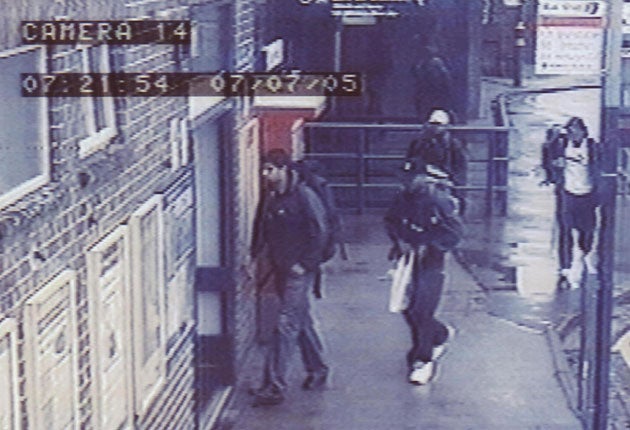MI5 and police attacked over secrecy as 7/7 inquest opens

More than five years after the 7 July London bombings, the inquests into the deaths of the 52 people murdered in the attacks will begin today. But the transparency of the process has been questioned after both MI5 and the Metropolitan Police made requests for some information to be kept secret.
The hearing, which is expected to last five months, will be the first time that the families of those who died will be able to ask questions about whether their relatives could have been saved.
But already there has been controversy after MI5 proposed that the coroner, Lady Justice Hallett, sit in private to hear highly classified material. And Scotland Yard has asked that some of the images and footage of the aftermath of the attacks be withheld from the public because officers fear that they could be used as propaganda by extremists.
Lady Justice Hallett is expected to hear submissions from the security services and the Metropolitan Police today when the inquest will also hear opening speeches.
But some family members are angered by the attempts to hold parts of the hearing in private. Graham Foulkes, whose 22-year-old son, David, was killed in the bombing at Edgware Road, said: "By every kind of moral standard that's wrong.
"They're employing every legal twist they possibly can not to be accountable. It really adds to the anguish that we're all feeling. They're deliberately frustrating the process."
The inquest, which has no jury, will be opened tomorrow by Hugo Keith QC, the counsel to the inquest. In his opening, which is scheduled to last two days, he intends to show previously unseen CCTV footage and still images showing the inside of the Tube carriages in the aftermath of the attacks.
It was then intended that the images, which have been carefully selected to ensure that none of the victims is shown, would immediately be made public on a website set up for the inquest. But last week the Metropolitan Police objected to this.
Max Hill QC, explained the force's reasoning, saying: "Those engaged in investigations into terrorist activities recognise that there is a sad but true fact of life which is that material, often distressing, showing the moments of immediate impact of events such as those of 7 July, is abused by others, for want of a better phrase, as propaganda for their own purposes."
The beginning of the inquest today marks the start of a process which the families of the dead have fought for during five years.
It has been delayed while various criminal cases connected to the bombings concluded. It is expected to call hundreds of witnesses including police officers, members of the public and senior figures from MI5.
Since Lady Justice Hallett began the pre-inquest hearings in February this year the cost has come to more than £800,000. The total cost of the inquest will run into millions of pounds.
In particular families are keen to discover whether the emergency services could have done anything more to save the lives of their loved ones. And they are attempting to discover whether MI5 and the police could have prevented the attacks, given their previous knowledge of some of the men involved.
It was revealed last year that the ringleader of the plot, Mohammad Sidique Khan, had come to the attention of the police and MI5 at least nine times. He and fellow bomber Shehzad Tanweer were observed meeting Omar Kyham, now a convicted terrorist, then the object of an MI5 terror investigation, three times.
But Khan and Tanweer were dismissed as "small-time fraudsters" and tracking them was said to be unfeasible given the resources of the security services and the apparent low threat the men represented.
There were suggestions originally that the inquests of the 52 victims could be held at the same time as the inquests into the four bombers – Khan, Tanweer, Hasib Hussain and Germaine Lindsay – but this was abandoned amid objections from the victims' families. It has also been suggested that the victims' families may seize upon the hearing's findings, should it rule that any of the emergency or security forces were in any way negligent, to fight for compensation. They have denied this.
Clifford Tibber, a solicitor who represents six of the victims' families, said: "These inquests represent the first opportunity for public examination of the facts and to consider, if there were failings, what lessons have been learned. My clients hope that these inquests will answer their questions. They want to ensure that any failings are identified, remedied and never repeated.
"There have been some cynical and insulting suggestions that the families are driven by aspirations of compensation. Such allegations are hurtful and untruthful."
Ros Morley, whose husband, Colin, died in the Edgware Road blast, added: "I want the inquests to look at whether any mistakes were made or flawed systems were in place.
"Innocent citizens in the UK and worldwide need to know that they are protected now and in the future. I hope it is possible to gain something positive out of a deeply tragic event."
